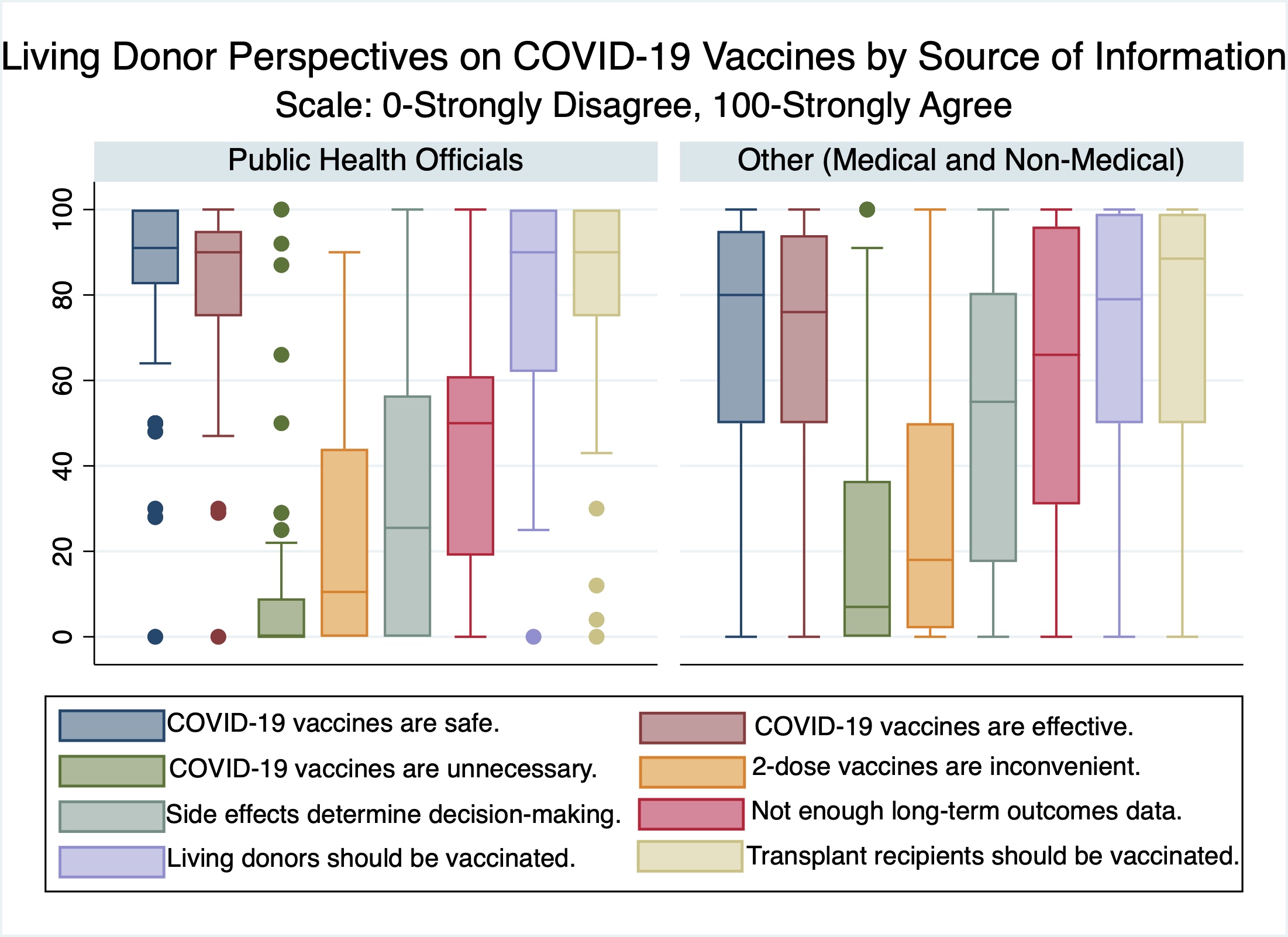Living Organ Donor Perspectives on Covid-19 Vaccines
1Medicine, Drexel University, Philadelphia, PA, 2Drexel University, Philadelphia, PA, 3American Living Organ Donor Fund, Philadelphia, PA, 4University of Nebraska Medical Center, Omaha, NE, 5Saint Louis University, Saint Louis, MO
Meeting: 2021 American Transplant Congress
Abstract number: LB 48
Keywords: COVID-19, Vaccination
Topic: Clinical Science » Infectious Disease » COVID-19
Session Information
Session Name: COVID-19
Session Type: Poster Abstract
Session Date & Time: None. Available on demand.
Location: Virtual
*Purpose: Promoting widespread COVID-19 vaccinations is a crucial strategy to protect living organ donors and transplant recipients during the pandemic. We examined perspectives and sources of hesitancy about COVID-19 vaccines among former and prospective living organ donors.
*Methods: We conducted an IRB-approved study of US living organ donors and prospective donors. An online survey was disseminated on multiple social media platforms between 12/28/20-2/9/21. Survey items included multiple choice, ranking, and ratings of agreement to statements about COVID-19 vaccine effectiveness, convenience, and importance. We used descriptive statistics and a multivariable logistic regression model to examine associations between respondent characteristics and preferences and COVID-19 vaccine acceptance.
*Results: Among 323 respondents from 40 US states and DC, 53% were 31-50 years old, 91% were non-Hispanic white, and 88% were female. Respondents included 267 living donors (94% kidney) and 56 in evaluation to donate (75% kidney). When asked if they would accept a COVID-19 vaccine, 76% answered yes, 11% no, and 13% unsure. Compared to those who would decline a vaccine or are unsure, respondents who would accept a vaccine were more likely to receive yearly influenza vaccines (48% vs 83%, p<0.001) and rely on public health officials for information (4% vs 35%, p<0.001). Respondents who relied on information sources other than public health officials were less likely to agree that COVID-19 vaccines are safe, effective, adequately studied or that donors and recipients should receive COVID-19 vaccines (Figure). Adjusting for demographics, education, and donor type, prioritization of public health officials for information and acceptance of yearly influenza vaccines were independently associated with higher COVID-19 vaccine acceptance (p<0.001 for both). The association between public health official guidance and higher COVID-19 acceptance was similar among respondents who do and do not receive yearly influenza vaccines (adjusted marginal probabilities of vaccine acceptance of 97% and 94%, respectively).
*Conclusions: Living organ donors who prioritize information from public health officials are more likely to accept a COVID-19 vaccine than those who rely on other information sources. Transplant programs could incorporate public health messaging and education when discussing the risks and benefits of COVID-19 vaccination.
To cite this abstract in AMA style:
Harhay MN, Klassen A, Zaidi H, Mittelman M, Bertha R, Mannon R, Lentine K. Living Organ Donor Perspectives on Covid-19 Vaccines [abstract]. Am J Transplant. 2021; 21 (suppl 3). https://atcmeetingabstracts.com/abstract/living-organ-donor-perspectives-on-covid-19-vaccines/. Accessed July 12, 2025.« Back to 2021 American Transplant Congress

